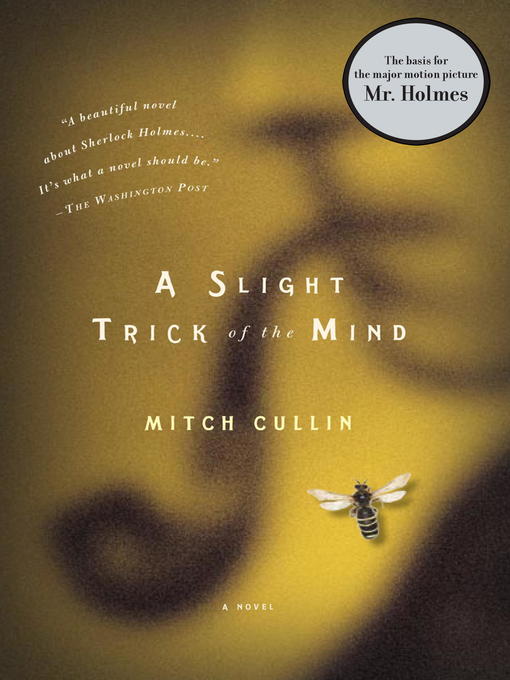
A Slight Trick of the Mind
فرمت کتاب
ebook
تاریخ انتشار
2005
Reading Level
7-8
ATOS
8.8
Interest Level
9-12(UG)
نویسنده
Mitch Cullinشابک
9780385515269
کتاب های مرتبط
- اطلاعات
- نقد و بررسی
- دیدگاه کاربران
نقد و بررسی

Starred review from February 14, 2005
The Sherlock Holmes pastiche is a time-honored tradition, though most attempts are interesting primarily to Sherlockians who pick them apart, searching for mistakes. But Cullin (Branches
; Tideland
; etc.) has produced an ambitious, beautifully written novel that examines an enfeebled but still intellectually curious Holmes as he copes with the indignities of old age. It's just after the end of WWII: Holmes's brilliant brother Mycroft is dead, as is Watson ("You know, I never did call him Watson—he was John, simply John"). Now 93, the great detective has been retired for decades; he spends his days immersed in his lifelong passion, beekeeping, and in writing various articles and letters. One of his projects is an account of a case concerning a mysterious young woman who played the glass armonica. Holmes will complete the manuscript by the book's end, and the fascinating result will explain something of his peculiar character. Cullin gives Holmes a companion in his housekeeper's young son, Roger; their close relationship is a great solace to the prickly and famously solitary old man. It is this elucidation of Holmes's "true" character that is the purpose of Cullin's story. This look at Holmes near his natural death is a delight and a deeply satisfying read—more so than Michael Chabon's recent The Final Solution
, which also features a nonagenarian Holmes. (Apr. 26)
Forecast:
Cullin's work is hard to pigeonhole—Texas noir (
Tideland;
Branches), coming-of-age novel (
Whompyjawed), academic satire (
The Cosmology of Bing)—but his talent is undeniable. This sophisticated spin on Doyle's perennially popular detective could take him up a notch recognition-wise.

April 15, 2005
In this refreshingly inventive novel, Cullin ("Tideland") explores what Sherlock Holmes might have been like at age 93. It is 1947, and the great detective is suffering from short-term memory loss; his mind wanders from his current retirement in Sussex to a case he worked on many years earlier in which Thomas Keller had accused music teacher Madame Schirmer of having an evil influence on his wife, Ann. In investigating, Holmes manufactured a brief encounter with Ann and found himself captivated by her unusual beauty. Back in the present day, Holmes has just returned from a trip to occupied Japan, and it turns out that his correspondent, Mr. Umezaki, is really more interested in the disappearance of his father 50 years earlier than in tracking down the elusive prickly ash plant. Does Holmes remember anything that could help? And does that disappearance connect somehow with Mrs. Keller's case? Cullin skillfully blends three distinct story lines and time periods while offering a fresh perspective on the Holmes legend. Given the enduring popularity of Sherlock Holmes, this is a solid choice for most public libraries. -Laurel Bliss, Princeton Univ. Lib., NJ
Copyright 2005 Library Journal, LLC Used with permission.

February 1, 2005
Conan Doyle's legendary detective is the main character here, but this isn't a new adventure in the manner of the inventive Dr. Watson's accounts. Holmes doesn't wear a deerskin cap; he doesn't smoke a pipe. And, as he says by way of Cullin, he never did. Rather, this is a quiet novel about an aging Holmes, still brusque and brilliant but also frail and forgetful. Relayed in part by Holmes himself, the story unfolds in three parts that entwine about the old detective like smoke from his mythical pipe. The first is a previously unrecorded case; the second is a musing about a visit to Japan during which Holmes meets a man whose father he once knew; the third, and most touching, deals with Holmes' friendship with his housekeeper's inquisitive son, to whom Holmes imparts his deep appreciation of nature, especially his love of beekeeping. Under Cullin's sure hand, the vibrant, assured detective we know gives way to a man who looks back with regret at missed opportunities in a manner that makes the larger-than-life figure surprisingly human.(Reprinted with permission of Booklist, copyright 2005, American Library Association.)

























دیدگاه کاربران